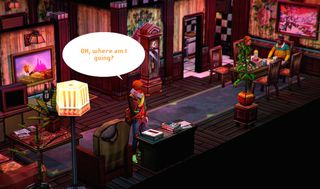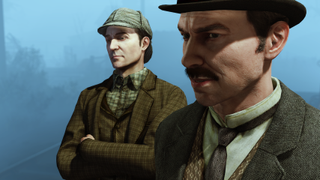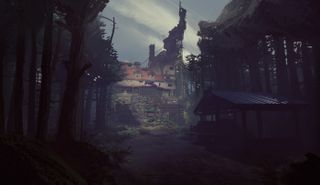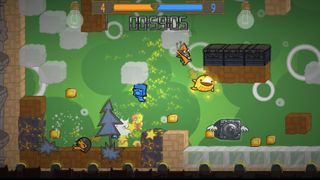
There are so many brilliant, weird, funny games around now. It is impossible to catalogue them all, really, but at least we can keep track of the curiosities we love and share them far and wide. We went around the team and selected a few games that deserve a signal boost, from musical adventures to a dog opera and a Sherlock Holmes adventure why not.
Ephemerid: A Musical Adventure

This mouse-controlled musical game won an Excellence in Audio award at the 2015 IGF, but I never would've heard of it had I not been trawling the show floor of GDC, where I met the developer and he got me to try the game. Drag the mouse around the screen to create different musical interactions in a variety of nature-themed settings—the music's amazing, fully deserving of its IGF acclaim, and it's cheap on Steam.—Samuel Roberts
D4: Dark Dreams Don't Die

Compared to the roughshod but charming Deadly Premonition, this much more refined and focused follow-up from Access Games was mostly ignored. This time-hopping adventure has you alternating between an aircraft filled with weird characters and your apartment, where your best friend is constantly making you meals. The goal is to solve the mystery of what happened in the murder of Little Peggy, the wife of your detective character, David Young. Unfortunately, D4: Dark Dreams Don't Die never sold well enough for the concluding episodes to be developed, meaning you're left on something of a cliffhanger. It's a weird and wonderful little world to step into for a few hours, though. —Samuel Roberts
Valley

If you like running and jumping really fast and sucking the life out of deer with magic gloves then Valley is the game for you. It’s a short, sweet hit of no-frills puzzle platforming in a verdant world full of forests and old ruins. It feels a bit like a good Half-Life 2 mod from 2006, but it is well-paced, and it captures the simple fun of speeding through a 3D environment very nicely. Put it in your Steam wishlist and surprise yourself with it one day in a sale.—Tom Senior
Oikospiel Book One: The “Dog” Opera

This is a tough one to explain. So, in the future, a guy named Donkey Koch starts a game development company called Koch games (with a logo that resembles Disney’s) and under his name Mr. Koch employs a lot of dogs. Generations and generations of dogs organized by the Union of Animal Workers, all developing a glorious global-gaming festival called The Geospiel. I think that’s what’s going on, at least. The game itself (the one you play) is portrayed as a videogame opera, where developer David Kanga’s choppy, beautiful arrangements integrate entirely with your actions. And those actions can vary wildly.
Sometimes you’re a spider or a rabbit running down a long food chain trail towards an anime character at the end. You might be a big glowing bear exploring an uncanny recreation of Kakariko village from The Legend of Zelda: Ocarina of Time. You might be a dog-mouse cursor hybrid, weaving your way through layers of an operating system, and then out the screen itself onto the desk, and into—well, see for yourself. Oikospiel is truly bizarre, a videogame that feels like it’s on the edge of disintegration, but it also has something to say besides, ‘what the hell?’ You might not leave it with a better understanding of opera, but you might leave curious about toxic games industry labor practices. If not, just read the libretto, a nearly 60-page book Kanga wrote as an accompaniment. And if you’re sold, you can buy the game at a price based on your salary or hourly wage. Don’t have enough cash? Generate some wind by waving your mouse around to slowly tick the price down. —James Davenport
else Heart.Break()

The problem with else Heart.Break(), besides the fact that it's called 'else Heart.Break()', is that it's initially totally bewildering. You're lost in a strange town, you don't know anyone, and you don't have any clear objective besides meeting some dude who's going to give you a job selling soda—and you don't even know where he is. But that's kinda the idea. Protagonist Sebastian has just moved to a new city, and how you feel echoes how he feels in some strange meta way. But stick with it and you slowly find yourself settling into the strange, freeform rhythm of this very peculiar, and very pretty, open world game.
PC Gamer Newsletter
Sign up to get the best content of the week, and great gaming deals, as picked by the editors.
When you find a Modifier, a tool that unlocks the game's hacking features, you realise just how unique it is. You can hack almost anything, altering its code to change its function. That could be hacking a door so that it leads somewhere else, or upping the caffeine content of a cup of coffee so you don't have to go to bed. But don't let the fact that there's coding involved—another thing that probably turned a lot of folk off—because everything you need to know to progress is in the game if you explore thoroughly enough. Part life simulation, part romantic comedy, and part hacktivist fantasy, there's nothing quite like else Heart.Break() on PC. And the soundtrack by El Huervo is superb. —Andy Kelly
Sherlock Holmes: Crimes & Punishments

Detective games rarely make you feel like you’ve actually done any detecting. That’s why Crimes & Punishments, in which it’s entirely possible to screw up a case and accuse the wrong person, is such a great take on the genre. You have to piece evidence together yourself in Holmes’s trippy mind palace, finding bits that fit together to create a linear narrative—a narrative that can be wrong. Besides that, it’s surprisingly gorgeous and incredibly atmospheric, set in Victorian London and beyond. There are a few awful bits, like a sequence where it turns into Tomb Raider for some reason, but by and large it’s one of the best interactive police procedurals you can play on PC. — Andy Kelly
What Remains of Edith Finch

This magical, inventive story game was highly scored when it came out, but feels as though it hasn’t reached the audience it deserves. Perhaps that’s because mansion-exploring is associated too closely with Gone Home. Perhaps it’s because What Remains of Edith Finch sounds like a follow up to the dreary Vanishing of Ethan Carter. In fact it’s a bittersweet journey through a fantastical family history. It’s funny, and gets darker as you inhabit the stories you discover in each room and explore Edith's family tree. I can’t say much more without spoiling things, except to say that —Tom Senior
BattleBlock Theater

A hilarious, energetic puzzle platformer with tons of levels, co-op, a level builder and Steam Workshop support. It’s a great package from the creators of Castle Crashers, and a great couch game if you can hook your PC up to a TV. Battleblock Theater also has one of the best endings to a game ever, featuring a song that will get stuck in your head for a long time. You have been warned. —Tom Senior
Replay—VHS is Not Dead

Be kind and rewind back to 2015 for this fun and clever time-bending platformer. In Replay—VHS is Not Dead, you basically just need to guide a characters through a room, often a trap-filled one, to an exit point. You can only move one character at a time, and when you do it records their movements. Then you rewind time and move someone else, and while you do that, the first character runs through the movements you just made. This gets pretty complicated, and sometimes you'll be trying to guide as many as five characters through a single level. It's sort of like playing a co-op game but your partners are all characters that you control, just at different times. There are even boss fights that work the same way. There's a fairly steep learning curve, but solving a tricky level is oh-so-satisfying. —Chris Livingston
The collective PC Gamer editorial team worked together to write this article. PC Gamer is the global authority on PC games—starting in 1993 with the magazine, and then in 2010 with this website you're currently reading. We have writers across the US, UK and Australia, who you can read about here.
Most Popular


